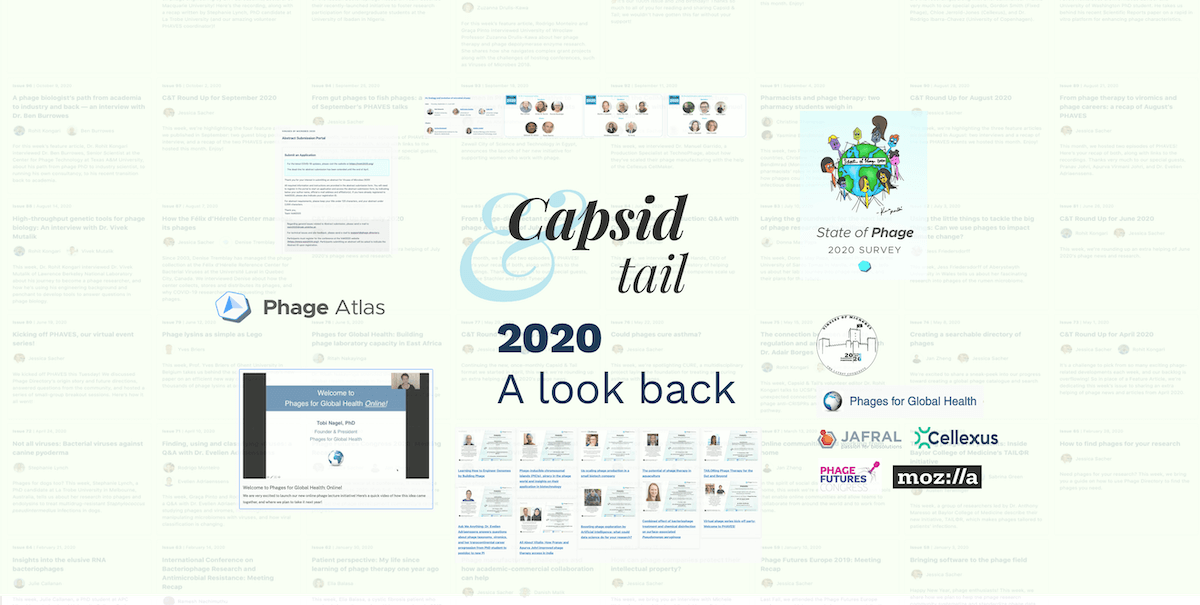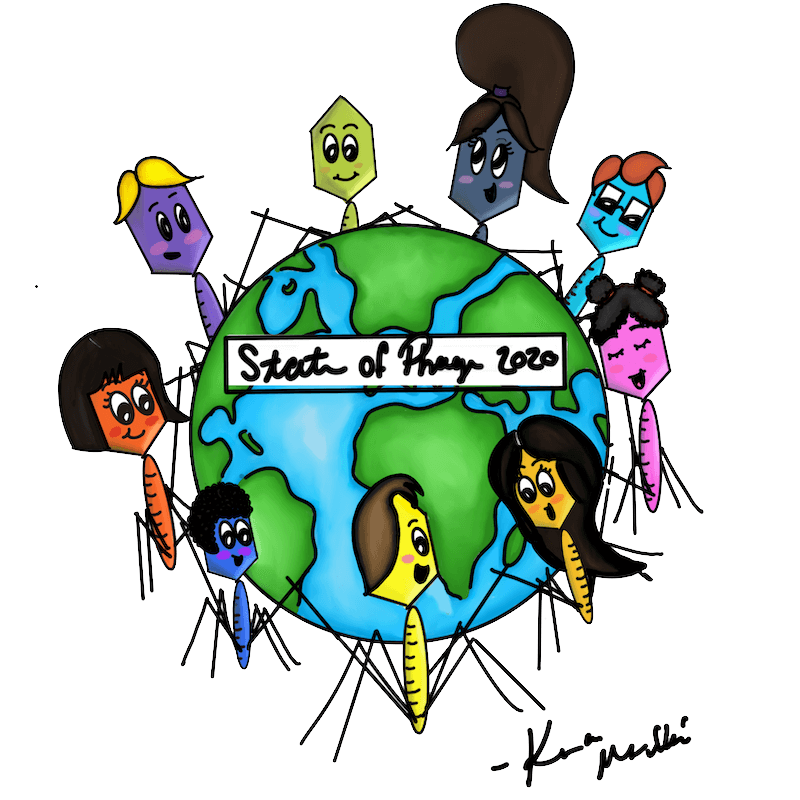Hi phage friends!
What a year it’s been! For our last issue of the year, we wanted to reflect back on the year’s progress, and the highlight some of the amazing collaborators and volunteers who have made it possible. Even though most of the year has been done in physical isolation, we’re really proud of the ways the phage community has come together virtually, and we feel fortunate to have been able to continue moving our various phage-y initiatives along!
Phage alerts for patient cases
Our original purpose was always to help patients and their doctors get phages fast. This year we helped source phages for 12 more urgent patient cases (bringing our total to 26 since we started 3 years ago). Excitingly, at the end of last year, one of our alerts led to the successful treatment of a 7-year-old in Australia, and the case report was just published as a preprint! This was done in collaboration with the Khatami and Iredell groups at the Children’s Hospital at Westmead and the Westmead Institute for Medical Research. And of course, none of this would be possible without the labs who respond to our alerts — for most alerts we send, we get replies within minutes to hours, and we are constantly amazed at the generous effort researchers put in for these cases. If you want to subscribe to get these urgent alerts, do so here.
Keeping the phage research community informed
Capsid & Tail milestones
Capsid & Tail, our flagship community resource, has been going strong this year! We published 49 issues this year (getting us to 106 issues total!), and we passed 1000 subscribers (from over 80 countries)!
Some of our favourites: Bringing phage susceptibility testing to India, an interview with Pranav and Apurva Johri, Phage lysins as simple as lego, by Yves Briers, Phages to treat secondary bacterial infections in COVID-19 patients? with Kathryn Kauffman, and Insights into the elusive RNA bacteriophages, by Julie Callanan.
We launched some new C&T issue formats this year, such as the Round Up issue at the end of each month, and monthly event recap issues. We’ve also put more of a focus on interviewing phage professionals this year, which we’re really excited about.
We’re excited to report that our guest author program we started in 2019 has continued to be a success; this year we had 26 unique guest authors and interviewers, and 9 guest interviewees! (Rohit Kongari takes the cake for the most guest author feature submissions this year — he conducted and produced 3 interviews!)
Two new experimental community-inspired initiatives: PHAVES and Slack
This year we launched two new experimental community initiatives that were directly inspired by the phage community. One was PHAVES (Phage Directory Virtual Event Series) (plus accompanying YouTube channel!). With the help of our key volunteer coordinator, Stephanie Lynch, PHAVES has been a huge success, and we successfully hosted 10 live events this year with incredible guest speakers and engaging breakout rooms with the community.
Based on the success of PHAVES, we’re pleased to announce that we will continue it monthly into the new year, so let us know if you’d like to recommend a speaker or give a talk! You can register for the series here, and watch any you missed on our YouTube channel here! PHAVES #6 with Dr. Sabrina Green on TAILORing phage therapy takes the cake for most views, with Piotr Tynecki’s talk on phage AI a close second!
We also launched a Phage Directory Slack community this year, which has also proven to be a great way to connect with fellow phage folks! We have 229 members now (join here!), with popular channels including #phage-protocols, #phage-ai-ml and #phage-manufacturing. As a bonus, our amazing volunteer, Madhav Madurantakam Royam, has been collecting the questions and answers posed in #phage-protocols, to be turned into a phage protocols compendium we’re building. Stay tuned for that!
Community partner initiatives
Viruses of Microbes 2020 and iVoM
We’re also proud to have collaborated with the Viruses of Microbes 2020 organizing team this year; what started as us building the abstract submission system for their conference turned into us teaming up with them and ISVM to host iVoM: Take a Walk on the VoM Side.
iVoM has been a wildly popular series of virtual seminars by top microbiologists studying viruses of microbes from around the world. VoM 2020 organized the speakers, and we supported the registration and event hosting, which turned out to be a fantastic collaboration! We’ve had more than 1100 registrants for this series of six webinars, with more signing up each month, and each event has brought in 200-400 live attendees.
We’re excited to host two more of these events in January and February (sign up here)! We’re also hopeful that soon, registration for the VoM conference will open back up, as the conference is set to be held in July 2021 (either in-person or hybrid).
Phages for Global Health Online
We also had the great opportunity this summer and fall to collaborate with the team at Phages for Global Health to take their phage training curriculum online! This has been generously funded by Mozilla, and should be launched very soon, so stay tuned! This will be a completely free, open course that has been specially designed to work well in low-bandwidth settings.
Phage tracking and exchange
A lot of the above focuses on our outward-facing initiatives, but much of our day-to-day effort is actually devoted to designing and building infrastructure to track phages and phage data. We do this by collaborating with groups who collect phages, particularly those aiming to mobilize phages for use therapeutically.
To this end, this year we’ve collaborated with two phage therapy consortia to submit national funding applications together (one in Australia and one in the USA), and we can’t wait see how they turn out! Our role in these projects will be to leverage our worldwide network of phage providers to supercharge efforts to collect, test and administer therapeutic phages, and to help teams ensure they’re collecting and storing their phage data in a way that optimizes its interoperability with what other phage groups are collecting. Long term, we hope to help phage groups collaborate more seamlessly by making it easy to share phages and phage data as needed.
We also had the opportunity to outline our vision in this area at two events this year: first at the 2nd Hanson Wade Bacteriophage Therapy Summit in August, where we co-hosted a workshop on the development and merits of a universal phage library with Austen Terwilliger of BCM TAILOR Labs. In September, we presented “Making the world’s phages more accessible, manageable, and shareable” (on YouTube here) as part of the Society for Bacteriophage Research and Therapy webinar series. Here, we introduced a new concept we’re calling Phage Atlas — if you’d like to learn more or get involved, please sign up here! For those who already have, thank you — we’ll be in touch in 2021!
Lastly, in collaboration with the Iredell team at the Westmead Institute for Medical Research, we’ve submitted a Current Opinion in Biotechnology perspective paper on this vision in the context of a phage biobanking network, and how we all see it supporting current and future phage therapy initiatives.
2020 State of Phage Survey
Many of you have likely seen our State of Phage survey by now, which is a census of the phages and strains labs are collecting, plus their methods and thoughts on sharing phages and publishing their phage research. We’re thrilled that more than 100 labs have completed it! Thank you so much! We’re still collecting results (and we’ll keep it open likely into January), but we couldn’t help sneaking some peaks at the data coming in. Here are some tidbits!
107 labs report having collected a combined total of 3,500 to 10,000 phages… against 126 species/genera
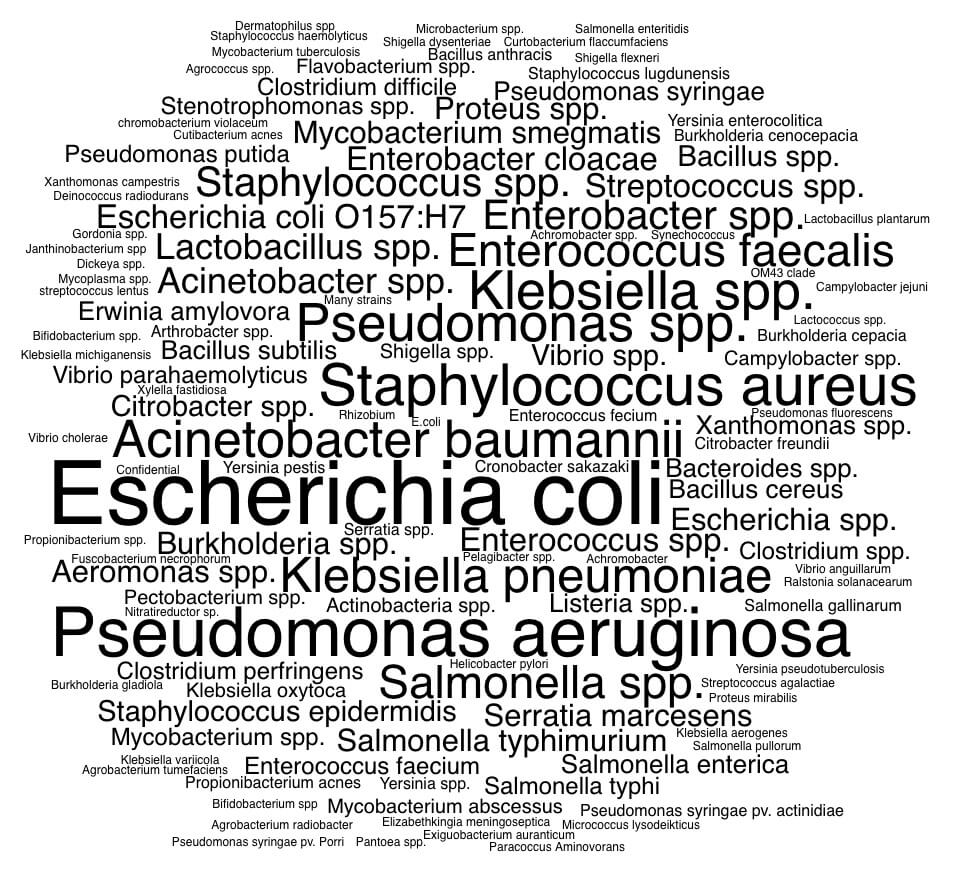
Labs use a huge diversity of methods and tools to study their phages (especially when it comes to bioinformatics tools!)
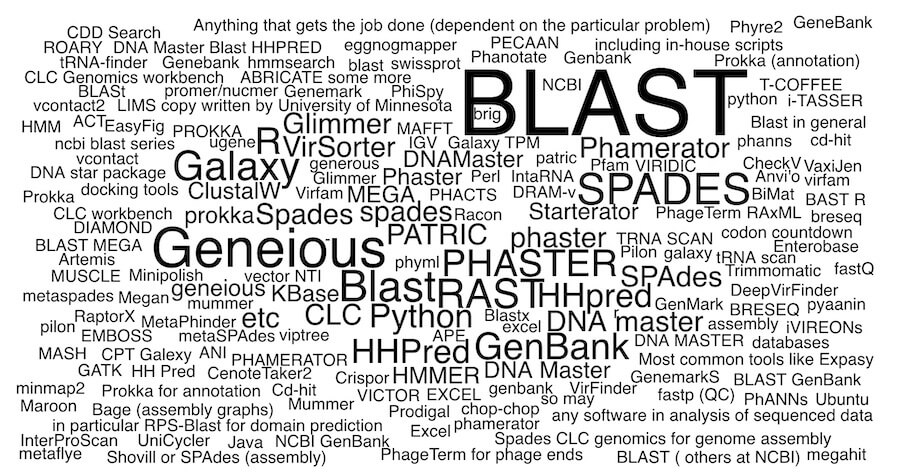
40 countries represented so far… wow!
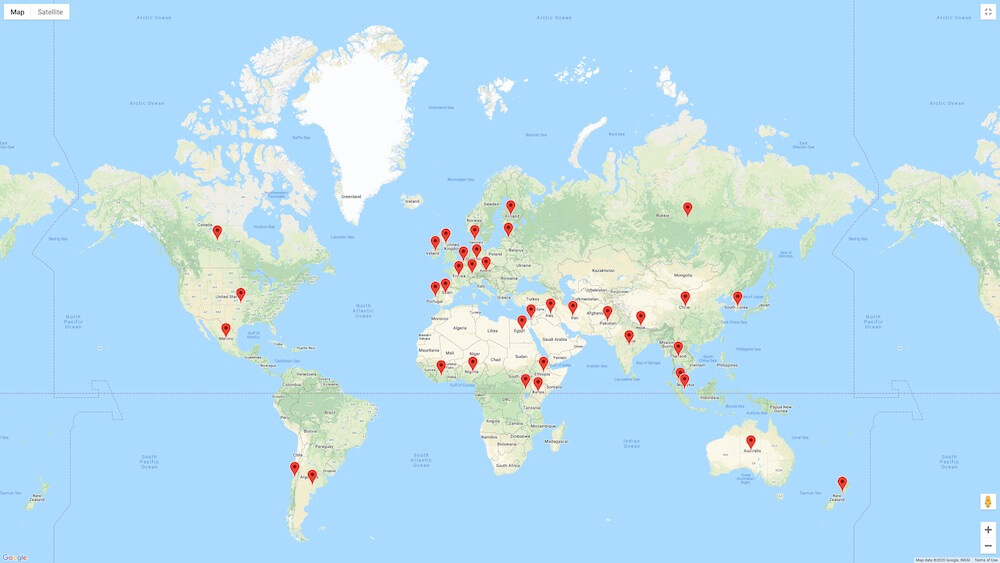
Stay tuned for the full report, which we’ll publish for the whole community to explore and share in Spring 2021 (*hint to prospective sponsors: if you’re interested in a unique opportunity to get in front of the phage research community, get in touch with us soon)!
Before we sign off, we’ve got some important people to thank!
We are thrilled to announce that our volunteer team has expanded recently! We now have 9 volunteers on our team, and we’re excited to see what we can all do together in 2021! We’re also endlessly grateful to our longstanding core volunteer team, who have been helping us behind the scenes for the bulk of this year.
Thank you, longtime volunteers!
- Stephanie Lynch: PhD student at La Trobe University studying S. pseudintermedius phages to treat infections in dogs, and our trusted PHAVES coordinator — she’s been integral in planning, organizing and promoting PHAVES!
- Dr. Rohit Kongari: Postdoc at FDA studying S. aureus phages and C&T interviewer extraordinaire! Rohit has also written many of our C&T What’s New summaries.
- Lizzie Richardson: Research scientist and phage enthusiast in Australia, and our amazing volunteer Capsid & Tail editor — she makes sure our guest author submissions are in tip-top shape!
- Madhav Madurantakam Royam: Grad student at the Vellore Institute of Technology studying aquaculture phages, and our phage protocols curator — he’s making sure your phage protocols questions and answers are saved, so the rest of the community can benefit from them in the future!
- Curtis Hoffmann: BYU undergrad student and phage hunter — Curtis is behind many of our tweets and LinkedIn posts, making sure we highlight phage researchers & industry milestones whenever possible!
Welcome, new volunteers!
- Atif Khan, scientist studying phages to control biofouling at the Bhabha Atomic Research Centre, and Tolulope Oduselu, University of Ibadan undergrad student and Ibadan Bacteriophage Research Team leader, who both started writing for the Capsid What’s New, Jobs and Community sections this month!
- Colton Shaner, BYU undergrad student getting into phage isolation, and Dr. Jess Friedersdorff, recent PhD grad from Aberystwyth University studying rumen gut phages, who will both be getting started soon!
Thank you, sponsors!!
Last but not least, a giant thank you to our sponsors, JAFRAL, Cellexus, and Kisaco Research. It’s been a pleasure to work with each of your teams, and we’re happy to help more of the phage community get to know what you’re doing. JAFRAL and Cellexus are addressing a major bottleneck for the phage field — phage manufacturing — and Kisaco continues to organize valuable conferences for the phage biotech community. Looking forward to continuing to work together in the new year!
Looking ahead to 2021
We’ll be sharing a bunch of new plans for the coming year in our January 1st issue of Capsid & Tail!
Merry Christmas everyone, and best wishes for a safe holiday season — see you in the new year!
— Jess and Jan <>{
Thanks also to our volunteers, Atif Khan and Tolulope Oduselu, for their work writing summaries for the What’s New and Community sections this week!

